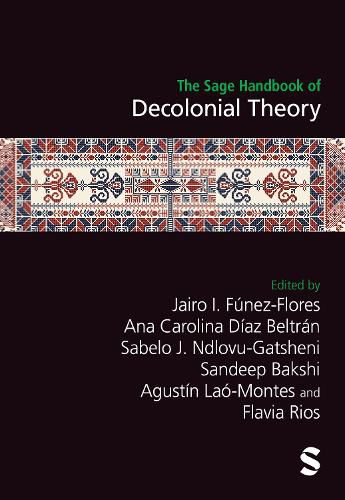Readings Newsletter
Become a Readings Member to make your shopping experience even easier.
Sign in or sign up for free!
You’re not far away from qualifying for FREE standard shipping within Australia
You’ve qualified for FREE standard shipping within Australia
The cart is loading…






The Sage Handbook of Decolonial Theory is a pioneering resource that expands the epistemological and geographical horizons of decolonial thought. This handbook prioritizes the Global South, fostering North-South and South-South inter-epistemic dialogues and situating decolonial thought in sites of struggle. It builds on a foundation of Black, Indigenous, and campesino decolonial thought and praxis from regions such as Chile, Colombia, Brazil, and Guatemala.
Addressing the erasure of knowledge production from the Global South in dominant academic spaces, this handbook brings together decolonial scholars and activist intellectuals from the Global South and engages with scholars in the Global North. It emphasizes the ethics of knowledge production and the importance of collaborative projects with marginalized regions and communities.
Organized into five parts, the handbook includes conceptual essays and empirical studies on decolonial thought and praxis. It covers a range of topics from (de)coloniality, geopolitics, and transdisciplinarity to decolonial feminist, gender, and sexuality studies, racial capitalism, and Pan-Africanism. The chapters convey a sense of urgency and a committed political voice, demonstrating how decolonial theory can interrogate and intervene in the modern/colonial racial capitalist heteropatriarchal world.
The Sage Handbook of Decolonial Theory is not just for academics; it is written for anyone interested in radical thought and praxis. It recognizes decolonial theory as a plural and dynamic field, concerned with power relations, historiographical interventions, and epistemological critiques of Eurocentrism. Ultimately, it teaches us how to think with and act alongside others in the struggle for liberation.
Part I: Key Debates in Decolonial Theory
Part II: Geopolitics and Geographies
Part III: Transdisciplinarity
Part IV: Feminisms, Genders, & Sexualities
Part V: Racial Capitalism
$9.00 standard shipping within Australia
FREE standard shipping within Australia for orders over $100.00
Express & International shipping calculated at checkout
The Sage Handbook of Decolonial Theory is a pioneering resource that expands the epistemological and geographical horizons of decolonial thought. This handbook prioritizes the Global South, fostering North-South and South-South inter-epistemic dialogues and situating decolonial thought in sites of struggle. It builds on a foundation of Black, Indigenous, and campesino decolonial thought and praxis from regions such as Chile, Colombia, Brazil, and Guatemala.
Addressing the erasure of knowledge production from the Global South in dominant academic spaces, this handbook brings together decolonial scholars and activist intellectuals from the Global South and engages with scholars in the Global North. It emphasizes the ethics of knowledge production and the importance of collaborative projects with marginalized regions and communities.
Organized into five parts, the handbook includes conceptual essays and empirical studies on decolonial thought and praxis. It covers a range of topics from (de)coloniality, geopolitics, and transdisciplinarity to decolonial feminist, gender, and sexuality studies, racial capitalism, and Pan-Africanism. The chapters convey a sense of urgency and a committed political voice, demonstrating how decolonial theory can interrogate and intervene in the modern/colonial racial capitalist heteropatriarchal world.
The Sage Handbook of Decolonial Theory is not just for academics; it is written for anyone interested in radical thought and praxis. It recognizes decolonial theory as a plural and dynamic field, concerned with power relations, historiographical interventions, and epistemological critiques of Eurocentrism. Ultimately, it teaches us how to think with and act alongside others in the struggle for liberation.
Part I: Key Debates in Decolonial Theory
Part II: Geopolitics and Geographies
Part III: Transdisciplinarity
Part IV: Feminisms, Genders, & Sexualities
Part V: Racial Capitalism